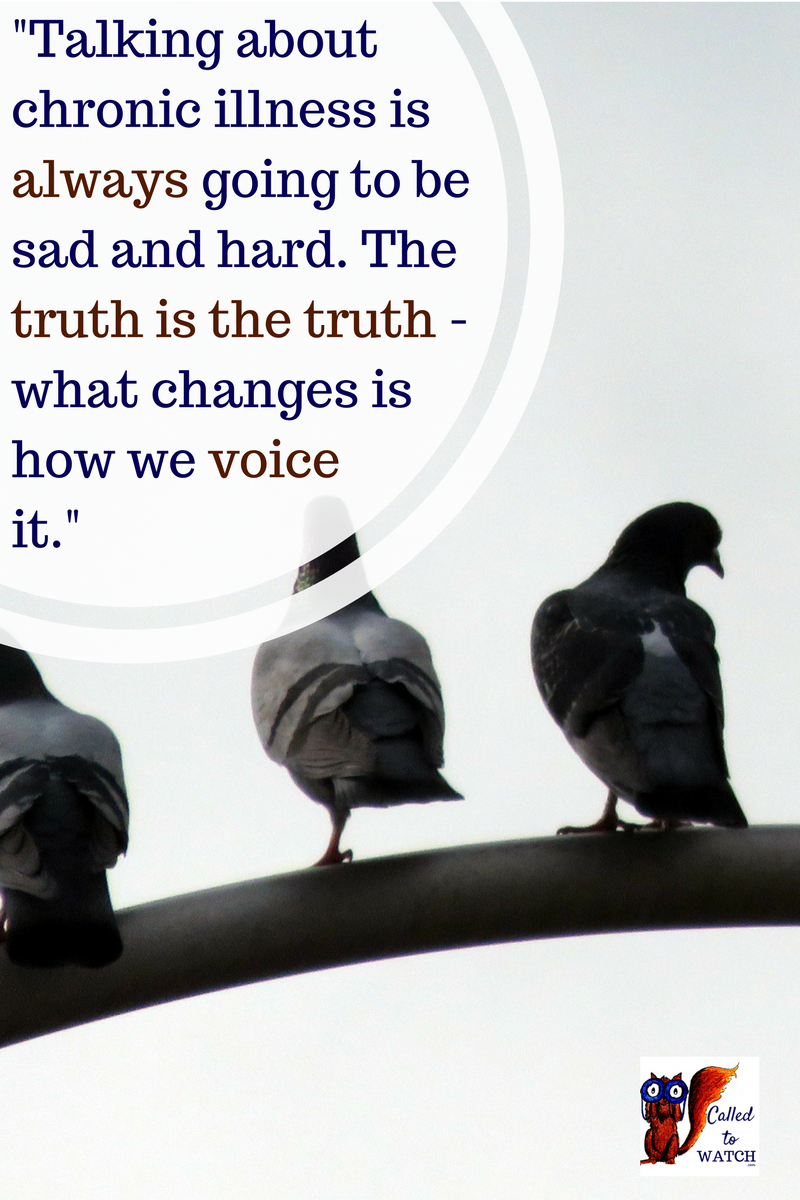Watching means that you, your Loved One, and their sickness, become common ground.
All of a sudden topics that under normal circumstances would require sensitivity, caution, a relationship or ‘easing into’ become a free for all.
And that’s hard to get used to. It never really becomes normal. People will always expect you to be able to answer deep, painful questions at a drop of a hat. Questions like:
How are you feeling?
Is it hard having a mum/dad/sibling/spouse/friend who is sick all the time?
How is your Loved One?
Does your Loved One get depressed?
Does your Loved One know that you find their illness hard?
And then there are ‘easier’ questions – which are nevertheless hard. Questions like:
How can I help your Loved One?
What is your Loved One doing today?
Is your Loved One able to do x, y or z?
Can you explain your Loved One’s illness again?
Should I give updates?
This is a question that will need to be addressed at some point or another.
Especially in the wake of a diagnosis, the people who love you and your Loved One will want to know what’s happening. They will (rightly) want to be kept in the loop.
This raises some points to ponder:
- Should you provide formal, regular updates?
- If so, for how long?
- How will you send them? Announcements, emails, a newsletter, text message?
- And to who? Your family only? Your work place?
- Or would it be easier to deal with peoples’ questions as they come?
- And what happens when you don’t have anything to say?
Some things to remember:
- At the beginning things will be changing rapidly. Updates can be helpful as the illness solidifies and you come to terms with what it will look like
- But the definition of ‘chronic’ means that soon it will settle down. Soon there will be little change
- It is alright to send updates only for the first few weeks. They are actually very helpful during this time, because it will be a very busy period, and mass updates mean you will not have to keep up with updating people personally
How do I answer off the cuff?
Even if you have updates at the beginning, and especially if you don’t, people will still ask questions. They will (on the whole) do it out of love and concern. Often there’s a bit of curiosity too.
We’re only human.
The problem is, these questions tend to drop out of nowhere. There is no time to prepare. No change to get into the ‘right’ mood. You will be dancing at a party or eating out at a restaurant and then – BAM!
“So, how does your Loved One manage to sleep through the night with their illness?”
Or,
“How is your Loved One?”
Often coupled with the dreaded question:
“Are they getting any better?”
These questions are hard.
And they are going to keep coming, so it is worth acknowledging that. It is also worth realising that there is never going to be an ‘ideal’ situation for answering them. Sure, at the end of a Bible study seems more appropriate than at an engagement party – but neither is really a perfect opportunity.
In life, there aren’t many perfect opportunities.


Talking about chronic illness may not get easier but you can be prepared
Talking about chronic sickness is always going to be sad and awkward and uncomfortable and hard. Maybe not all of these at once, but it will be difficult.
Why?
Because it will always be a sensitive topic for us. It will always touch on the deepest recesses of our life, on our hopes and on our dreads.
I think perhaps that part of being a Watcher is to accept that. I have been answering these questions for over fifteen years – and while it does get easier, it is still hard.
And chronic illness, while it stays the same, also changes every day, as every human’s situation changes daily. This means the questions are always valid. It also means that we will always be answering ‘off the cuff’.
Prepare your answer
It sounds incredibly cold and analytical to type this – but we can prepare our answers. In one sense, all of us prepare our answers. We have some idea what we are going to say before we say it, even if it is only that we know the next word in our sentence one second before it comes out.
No, Watching is not a job interview, but the questions that come will generally repeat themselves.
How is your Loved One? (some thoughts)
- Specific is good. Specific is helpful. Perhaps about that day/week. If you know you are going somewhere and people will ask, perhaps you can think of a specific thing to share beforehand, or make sure to ask your Loved One before you leave
- Truthful is good, but hard. Lies, although easier, never helped anyone.
- Hopeful (when it is true) can help. Because otherwise we feel depressing when we answer, and sometimes get depressed ourselves. Perhaps something our Loved One is looking forward to or a good day they had (there is not always going to be something a bit more hopeful to share, but sometimes in searching I discover hope myself!)
- It is okay to be general sometimes, depending on the audience, your emotional state, and how long you have to answer. Sometimes ‘the same’ is the best answer I can give.
How are you? (some thoughts)
- General is always the easiest, but the worst. ‘I’m okay’ is the most non-descriptive response ever, but sometimes it is all we can summon
- Thank them for asking how you are in relation to your Loved One (even if it’s hard to answer). It is a valuable, but rare, question.
- It is okay to admit to sadness, to guilt, to frustration and then not go into details. It is okay to say you are having a bad day but you don’t want to talk about it.
- Sometimes it is only when people ask that we realise that actually we are having a great day or have a lot to be thankful for – or the opposite, we discover that we are actually falling apart.
Answering frustrating questions
Not all questions are created equal. I touched on that above, by mentioning the dreaded: ‘When will your Loved One get better?’
The most ungracious response I’ve given to that is: ‘They won’t.’ and changed the topic abruptly.
The most gracious? ‘Well, the thing is… it’s a chronic illness. They’re not going to get any better. Only worse.’
Noticed anything?
The content of these responses is rather similar. The truth is the truth – the only thing that changes is how we voice it.
And that, my fellow Watchers, is everything.
At times it’s tempting to want to scream in frustration at some questions.
To take the other person by the shoulders and ask:
Haven’t you read my email? I answered this question there, so I wouldn’t have people coming up and asking it.
Haven’t you listened to anything I’ve been saying for the past half hour?
Are you an idiot? Chronic means chronic!
Ah my friends.
People are frustrating.
But we are people, and we are frustrating too.
None of us are perfect. But we are called to speak the truth in love (Ephesians 4:15). That doesn’t mean we lie and it doesn’t meant we twist the truth or dodge the question.
It means we respond honestly and openly – even when that is what we least feel like.
It means we choose to remind ourselves that:
They are asking for a reason. What right have we to be cynical? They care enough to ask the question, so surely we can care enough to answer.
Their life does not revolve around our Loved One’s chronic illness, so it is okay if they do not know as much as us, or do not listen as well as we would like. Their lives revolve around other trials – do we listen to them as intently as we expect them to listen to us?
Answering the same question a thousand times is an opportunity to be like Christ.
Because Christ was exceedingly patient during His life on earth, and is patient with us into eternity. He doesn’t snap at us and say ‘You’ve prayed that prayer already!’ or ‘You’ve done that sin a thousand times!’ or ‘don’t you dare ask for forgiveness one more time today!’ He responds in love, and thus in doing so we mirror Him.
And so we live and answer
There is no right response. No true method. These are just thoughts. The only law we have to follow is:
Love God
And
Love others.
That is, speak the truth, and speak it kindly.
And that, my friends, is enough.
// Are there specific questions you struggle to answer? Why? How can we answer truthfully and yet with love? Is it possible?
Don’t just read silently, encourage others and share your thoughts!
PS: Enjoyed the post above? Get the next one delivered straight to you! Sign up for email notifications
I’m also on Facebook, Pinterest & Twitter! Meet me there for more interesting reads, resources and community.



